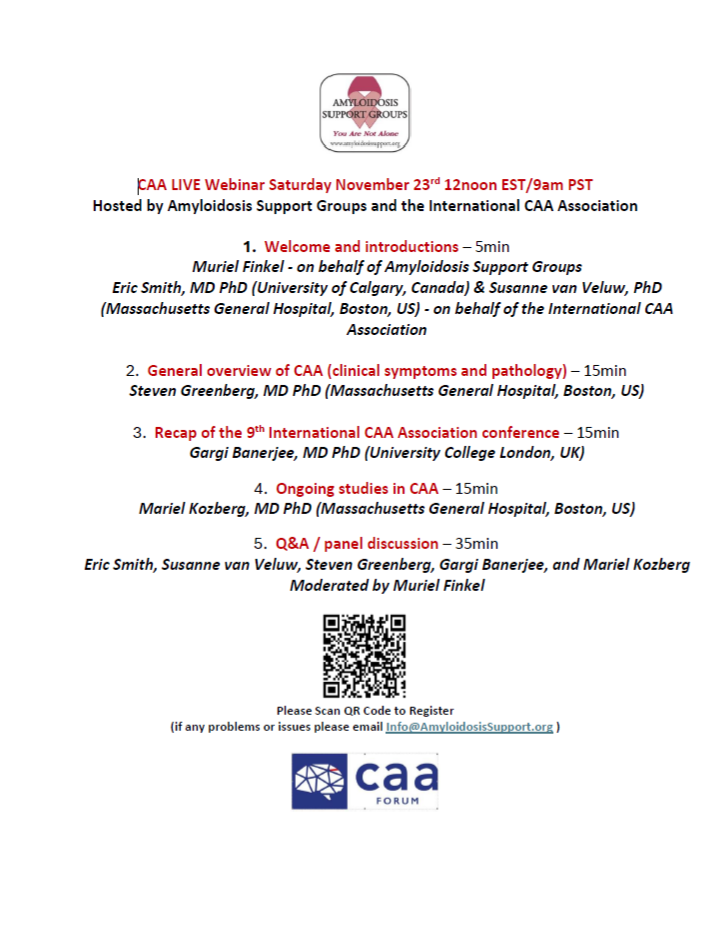News & Events
New International Guidelines for Diagnosing and Managing Cerebral Amyloid Angiopathy
The International CAA Association (ICAAA) in partnership with the World Stroke Organization, is delighted to present updated guidelines for the diagnosis and management of CAA, published in the International Journal of Stroke: “Diagnosis and Management of Cerebral Amyloid Angiopathy: A Scientific Statement from the International CAA Association and the World Stroke Organization”.
The guidelines – which have been the result of more than two years of dedicated collaborative work by representatives from the international CAA field – cover five topics in clinical practice:
1) Diagnosis, testing, and prediction of intracerebral hemorrhage risk;
2) Antithrombotic agents and vascular interventions;
3) Vascular risk factors and concomitant medications;
4) Treatment of CAA manifestations;
5) Diagnosis and treatment of CAA-related inflammation and vasculitis.
We hope these guidelines will serve as a valuable resource for clinicians worldwide, improving the diagnosis and management of CAA and raising awareness of this common condition.
Images of CAA, a new informative webpage, is now live!
“Images of CAA” is a project in which we want to share pictures of research into CAA. Researchers use special imaging tools to study CAA, which often results in very detailed and interesting pictures.
We want to share some of these pictures with you! The images are meant to be informative, but we hope you will also appreciate that they can be quite beautiful.
Please have a look at the page and check back later to see new additions. We hope you will find the page useful and valuable.
Are you a researcher who wants to contribute to the page? Please reach out to us at office@caaforum.org!
Recap of the 9th International CAA Conference
The 9th International CAA Conference was held in Munich, Germany, between Tuesday October 15th and Thursday October 17th 2024.
The conference took a wide-angle lens to preclinical and clinical research in CAA, with a strong emphasis on novel and topical areas in the field with the greatest potential for translation. Highlights included sessions on: the role of the glymphatic system and other brain clearance mechanisms in CAA pathogenesis; exploiting large scale approaches (e.g. proteomics, single-cell RNA sequencing) to identify novel treatment targets in CAA; the evolving story of ARIA (amyloid-related imaging abnormalities) and anti-Aβ immunotherapies; the increasingly recognised clinical and public health implications of iatrogenic Aβ transmission. These broad themes were complemented with invited talks and abstract presentations on the blood-brain barrier in CAA, emerging neuroimaging techniques, and novel therapeutics and upcoming clinical trials for CAA. There were clinical talks considering the interface between CAA and common conditions such as hypertension and atrial fibrillation, and also the highly interactive International CAA Association guideline presentations; both these sessions provoked lively debate amongst the audience, and provided pragmatic perspectives for managing the complexities encountered in clinical practice. Participants were able to enjoy plenary talks from Christian Haass and Martin Dichgans, which nicely illustrated how scientific principles and approaches for Alzheimer’s disease and cerebral small vessel disease can have relevance and application in CAA.
Outside of these stimulating scientific sessions, there were multiple opportunities for social interaction and networking, including the well-attended conference dinner in the Ratskeller. Professor Steve Greenberg really captured the conference’s atmosphere when he described it as resembling “a family reunion”, which gives some sense of the friendly and collegiate mood that prevailed. The conference was a great success, and whilst two years might seem too long to wait for the next conference, the upcoming publication of International CAA Association guidelines, exciting new changes to the Association’s structure and mission, and expansion of the Early Career Researcher Network will engage and sustain us whilst we impatiently look forward to the 10th conference in Banff in 2026.
CAA Webinar November 23rd 12:00 EST

10th International CAA Conference
We are pleased to announce that the 10th International CAA Conference will take place in Banff, Alberta, Canada from September 15th to 17th, 2026. Additional information regarding the conference will be made available soon here. We encourage you to mark your calendars and plan to join us for this exciting gathering of researchers, physicians, and others interested in CAA. We look forward to seeing you there!

The International Registry for Iatrogenic Cerebral Amyloid Angiopathy is now LIVE!
We are thrilled to announce the launch of the International Registry for Iatrogenic Cerebral Amyloid Angiopathy (iCAA), an initiative aimed at gathering data on cases with iCAA around the globe.
iCAA occurs following medical procedures as a consequence of transmission of the amyloid-β protein. The causative procedures to date have mostly used cadaveric human material; this includes cadaveric dura mater (including “Lyodura”) for dural patches and for embolization, and treatment with cadaveric human growth hormone. The full range of causative procedures are not known; others, such as neurosurgery without cadaveric material and blood transfusion have also been implicated.
The registry will gather essential data on the incidence, clinical presentation, natural progression, and potential causative factors associated with iCAA. It will provide regular (annual or biennial) reports on the number of cases identified worldwide, and a rolling report on clinical follow-up events. The Registry will also act as a platform to facilitate future sub-studies, for example those relating to fluid-based or neuroimaging biomarkers.
The registry has received full ethical approval. It asks for completely anonymized data, which can be entered via a secure online portal. Follow-up data will be requested annually.
If you have clinical experience working with iCAA patients, please participate! This collaboration will significantly contribute to advancing knowledge and promoting effective strategies for managing and preventing iCAA.
For more information, please get in touch with g.banerjee@ucl.ac.uk or k.kaushik@lumc.nl
The Leducq Foundation Awarded an $8 Million Grant to Understand the Role of Brain Clearance in Cerebral Amyloid Angiopathy
The Leducq Foundation has awarded a five-year $8 million grant to fund a new transatlantic network of excellence to study the role of brain clearance in cerebral amyloid angiopathy (CAA). CAA is the main cause of hemorrhagic stroke, an important contributor to cognitive decline in older individuals, and the most common vascular comorbidity in Alzheimer’s disease. With the rising aging population, CAA is increasing, and effective disease-modifying interventions are nonexistent. Accumulating evidence is suggesting that defective perivascular brain clearance of waste products (including Amyloid) plays an important role in the pathophysiology of CAA. However, there are many fundamental unknowns regarding how the brain clears waste. Unraveling the mechanisms of brain clearance will have major implications for understanding CAA as well as other common dementia disorders.
The consortium is expected to officially start January 1st 2024, and includes investigators from research sites across the US and Europe: Dr. Benveniste (Yale University, CT), Drs. Iliff & Shih (University of Washington, WA), Dr. Van Nostrand (University of Rhode Island, RI), Drs. Van Veluw & Greenberg (Massachusetts General Hospital, MA), Dr. Bakker (Amsterdam University Medical Center, the Netherlands), Dr. Carare (University of Southampton, UK), Dr. Lorthois (Institut de Mécanique des Fluides de Toulouse, France), Dr. Petzold (German Center for Neurodegenerative Disease in Bonn, Germany), and Dr. Van Osch (Leiden University Medical Center, the Netherlands). The network will be led by North American coordinator Dr. Susanne van Veluw and European coordinator Dr. Matthias van Osch.
The goal of the network is to use a translational approach to study brain waste clearance in CAA. The overarching consortium aims are to 1) establish a data-driven, integrated multi-scale understanding of perivascular brain clearance in health and CAA, 2) translate experimental findings from rodent models to the human brain, and 3) identify relevant driving forces to be tested in future clinical trials to enhance brain clearance.
The Leducq Foundation is an international grant-making organization with a mission to improve human health through international efforts to combat cardiovascular disease and stroke. By forging scientific alliances that transcend national borders and educating young researchers who thrive in an international context, they hope to promote long-term collaborative relationships and to foster innovations in cardiovascular and stroke research, to change the way that patients with cardiovascular and neurovascular disease are diagnosed and treated. For more information, please visit https://www.fondationleducq.org/
“Interested in joining the network? See here for job opportunities.”
Recap of the 8th International CAA Conference
The 8th International CAA Conference took place on November 3-5 in Perth, Western Australia. It was a unique meeting in several regards. This was the first time that an International CAA Conference was held outside of Europe or North America, and our first in-person meeting after the Covid-19 pandemic. A broad range of topics was discussed, including novel insights related to iatrogenic CAA, Dutch-type CAA, perivascular amyloid clearance, biomarker research, and Amyloid-Related Imaging Abnormalities (just to name a few). Another ‘first’ was an up-date on the development of the International CAA Association clinical guidelines. The goal of these guidelines will be to provide clinicians worldwide with evidence-based recommendations for the diagnosis and management of CAA. They will be posted on the website as soon as they are finalized. The conference was concluded by a public forum, a first of a kind meeting where researchers and patient advocates from three continents came together in one room to talk about CAA, including Dutch-type CAA. Overall, the 8th International CAA Conference in Perth was a huge success. A big thank you to the local organizers: Drs. Hamid Sohrabi, Ralph Martins, Kevin Taddei, and Samantha Gardener.
The new Boston Criteria (version 2.0) for the diagnosis of CAA were just released
A definite diagnosis of CAA can only be made after death, by examining the brain tissue under the microscope. A breakthrough in the field was the introduction of the Boston criteria in the 1990s, which allowed for the first time to make a diagnosis of possible or probable CAA during life. These criteria are based on the presence of characteristic neuroimaging markers, such as microbleeds in the outer regions of the brain. In 2010, the criteria were updated (modified Boston criteria or version 1.5) as knowledge evolved and imaging techniques improved. And now here we are: twelve years of experience and observations later, with the Boston criteria version 2.0. In this updated version, new imaging markers are included to further help doctors in diagnosing CAA. See for more information here.

